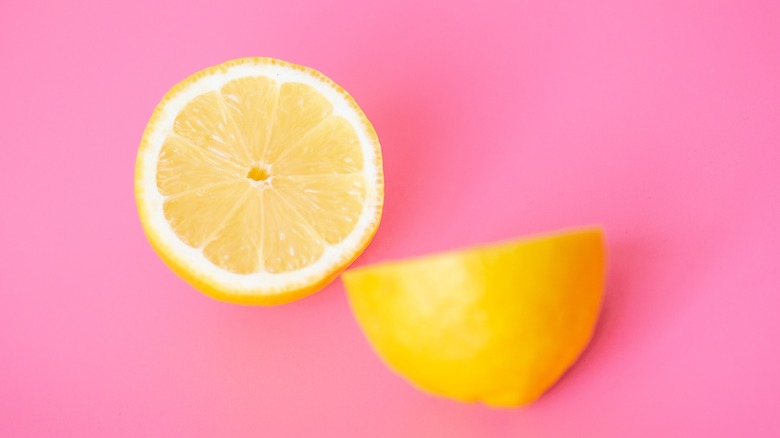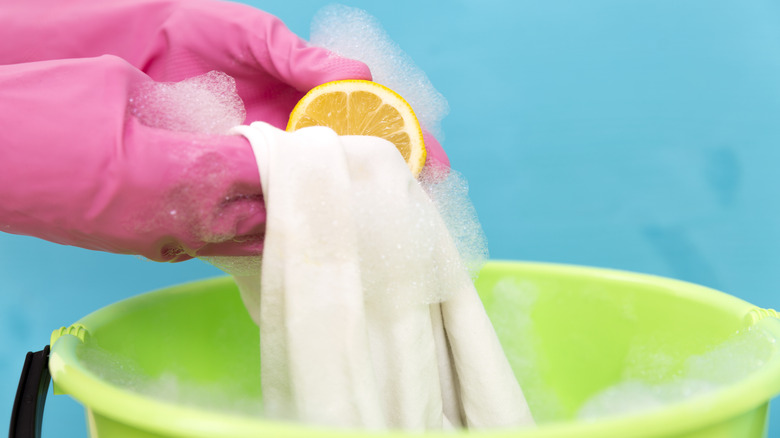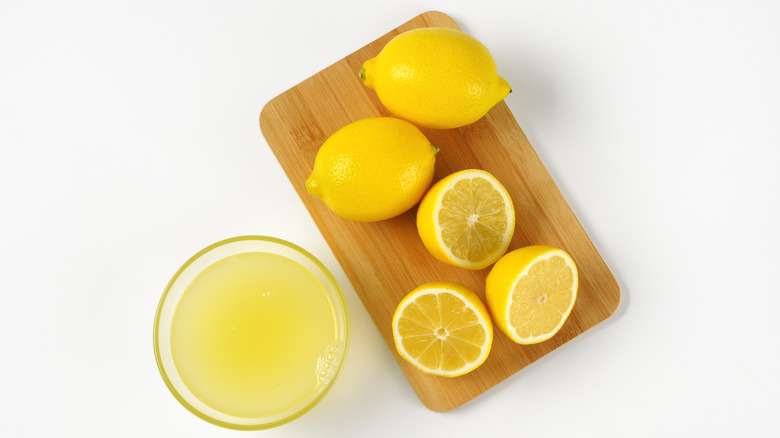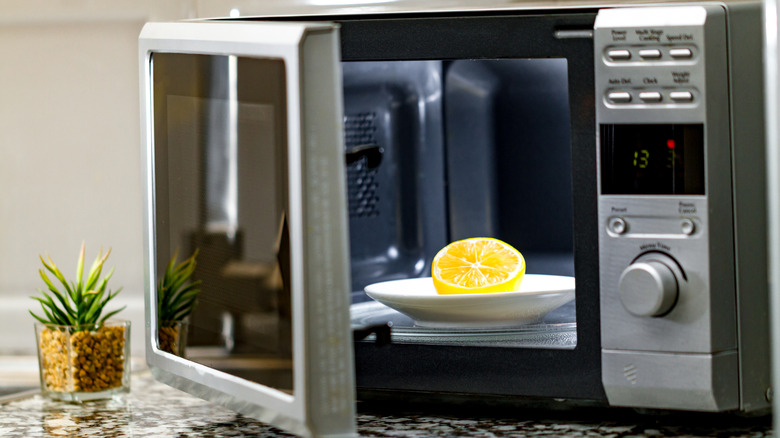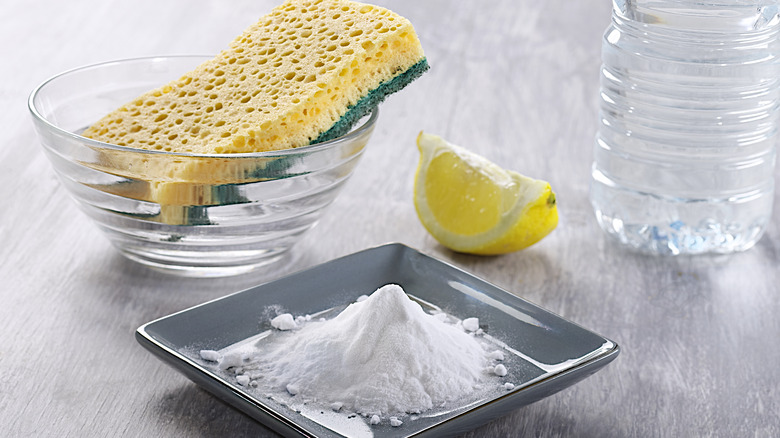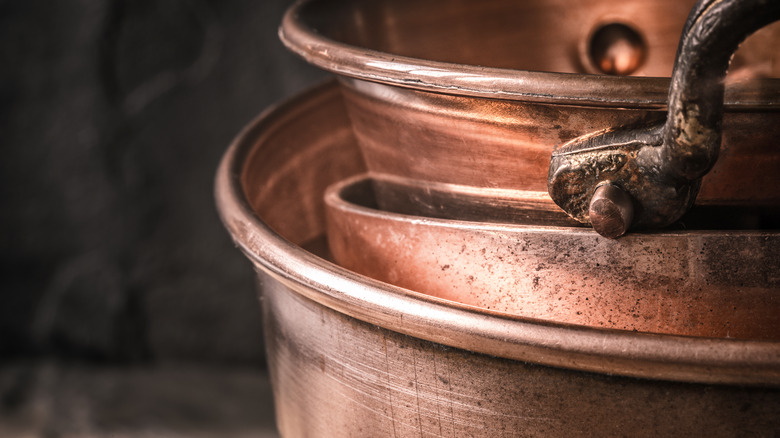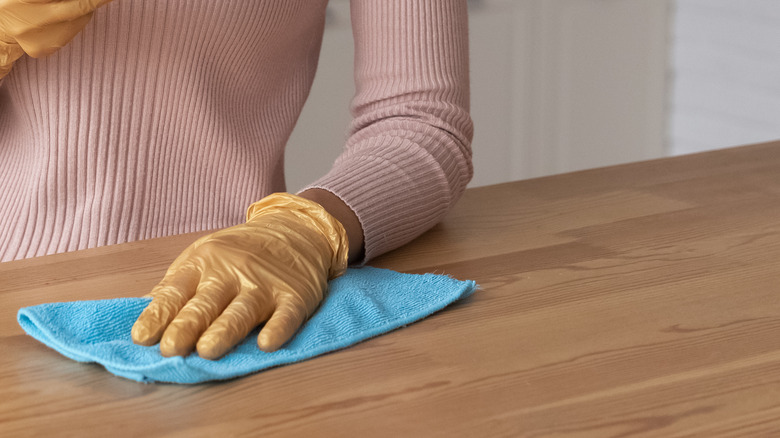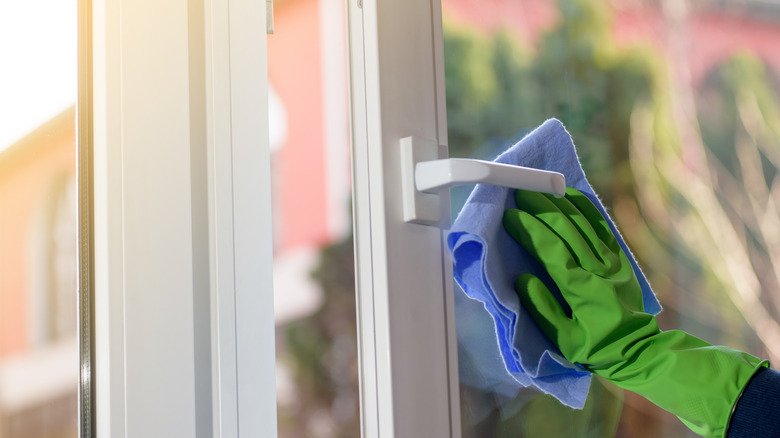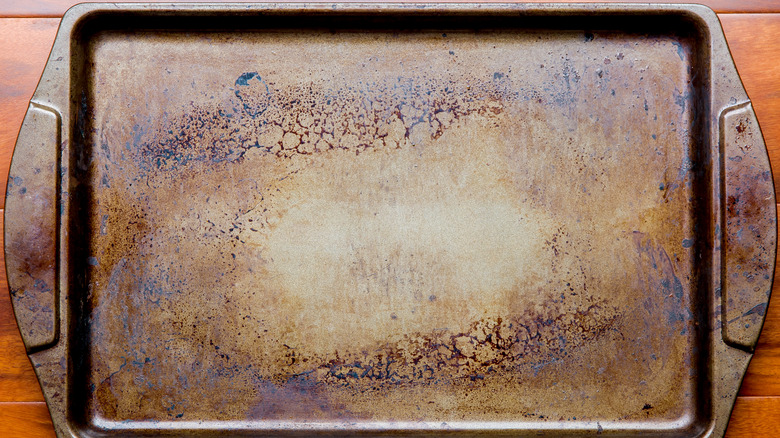8 Best Household Uses For Lemon Juice
Lemons are a cooking staple, but their uses go far beyond the kitchen. The citric acid in lemon juice makes it a powerful antibacterial cleaner, according to Kitchn. Its acidic properties also remove stains caused by acids (like sweat or wine), and neutralize odors.
Because they run fairly cheap and are all natural, you may want to start replacing commercial products you use in your daily life with a simple squeeze of lemon. When creating a lemon juice cleaning solution, avoid making large batches, since the unrefrigerated lemon juice won't keep for long. Taste of Home says to store whole lemons in the fridge for a longer shelf life, where they should last about a week in a crisper drawer (sealed in an airtight bag or container, they'll last up to a month). And if you have leftover lemon juice, refrigerate and use it within a week. With these fantastic uses for their juice, the lemons in your fridge will never get a chance to become moldy again.
1. Lemons remove stains on white clothes
The laundry probably isn't the first place you picture using lemon juice, but it has many uses on clothes. One is lifting stains, Speed Queen says, due to lemon juice's citric acid, which breaks them down. You'll want to be careful with certain materials, but you can soak stains on most white cottons in 1/3 cup of lemon juice mixed with 2/3 cup of water, then wash. Lemons also naturally bleaches whites (so take care if other colors are involved). Add 1/4 to 1/2 cup of lemon juice in place of bleach when running a white load to brighten them.
If you have underarm stains on white tees, The Spruce recommends using lemon juice to remove them. Create a solution with equal parts lemon juice, baking soda, and water, and gently scrub it on the stain. Let it sit for 30 minutes before washing. White socks can also be brightened up with lemon juice — Almanac suggests boiling them in water with a hunk of lemon.
2. Lemons disinfect and deodorize cutting boards
When wooden cutting boards start to appear drab, rotating in a lemon juice scrub every so often will make them look like new. First, coat the cutting board with a sprinkle of coarse salt (i.e. sea salt), Kitchn suggests. Rub half a lemon along the surface, squeezing to release the juice in different sections. Once you've scrubbed the whole board, let it sit for five minutes. A greyish liquid may puddle up along the surface — scrape it off after you've let the lemon juice do its magic, then rinse the board clean. This method also works with wooden utensils and rolling pins when they need a little extra love.
Per Epicurious, you should wipe down your cutting board with a dry towel after rinsing it to avoid water warping the wood (as well as mold growth). They recommend drying it in a standing position, not laying it down flat. Finally, treat your wooden cutting board with mineral oil about once per month to make it really last.
3. Lemon juice cleans microwaves
Microwaves can get messy pretty quickly, and if you don't clean them regularly, buildup and dried food splatter become harder to wipe off. Since you're cooking food inside of them, natural cleaners are your best bet for cleaning microwaves, and that's where lemons come in. Prevention writes that squeezing a lemon into 1/2 cup of water in a microwave safe bowl makes a great cleaning solution (you can even leave the discarded lemon halves in the bowl for an extra boost). Microwave the solution for three to five minutes, until the water boils and you can see steam on the window.
Carefully remove the bowl of lemon water and wipe down the interior, from top to bottom. Per Hunker, avoid using abrasive sponges or brushes when cleaning the inside of microwave so you don't scratch the hard plastic interior. Instead, opt for a soft cloth or non-abrasive sponge.
4. Lemon juice removes rust
Believe it or not, lemon juice can also remove rust from metal. When iron reacts with oxygen and water, the reddish flakes that collect are commonly dubbed rust, according to Reliance Foundry. One way to lift rust off metal is to use its chemical opposite: an acid. Here's where lemon juice comes in. GardeningEtc says all you'll need is a lemon and some salt. Cut the lemon in half and rub each cut side generously with salt, then scrub the lemon half on the rusty metal. Unless it's been collecting for years (or holes have appeared due to rust), this should do the trick in removing rust. Let the lemon juice sit on the surface for a bit, then rinse off with water.
For smaller areas you'd like to clean with a finer instrument, like a cleaning toothbrush, you can make a simple scrub by mixing a tablespoon of lemon juice with 2 tablespoons of salt, Almanac says.
5. Lemons clean copper pots
Caring for copper pots is a continuous task. By simply chilling in a cupboard, the metal slowly tarnishes over time, dulling its gorgeous red sheen. Food 52 notes that the black-brown tarnish, or copper oxide, comes from oxygen reacting with the metal, and that if you don't clean it up, it can eventually morph into that greenish-blue Statue of Liberty hue.
Luckily, lemon juice can easily tackle copper tarnish. Halve a lemon and coat it with a coarse salt. Scrub the lemon half directly on the pot, then let the pot sit for a few minutes. Once the pot's original color begins peeking through the tarnish, wash it with soapy water, rinse, and polish dry with a towel. Note that Kitchn warns not to use an acid like lemon juice or vinegar to clean copper that has a lacquered coating. You should hand wash your copper cookware, no matter how tempting the dishwasher may be.
6. Lemon removes scratches from wood
Scratches in wood can be taken care of by a homemade lemon oil solution, which also makes a great wood polish. All you'll need is lemon juice and a cooking oil straight from the kitchen (like vegetable oil or olive oil). First, clean the area where the scratch is located before working with it. Mix equal parts lemon juice with your oil, Cleanipedia says, then dip a soft cloth into the lemon oil mixture. Rub into the scratch until it disappears in a circular motion, with the grain.
Mix 2 parts olive oil plus 1 part lemon juice for your wood polish, and for unfinished wood, DoItYourself recommends mixing 1 tablespoon of your lemon oil with 1 pint of mineral oil (be sure to spot-test your homemade polish before going to town). While there are plenty of commercial lemon oil polishes at stores, your DIY version is both inexpensive and free of harsh chemicals. Added bonus: It will smell like a citrusy dream!
7. Lemons clean windows and glass
Another use for lemon juice at home is cleaning glass and mirrors. Reader's Digest has a quick and easy recipe: Pour 3 tablespoons of lemon juice and 1 cup of water into a spray bottle, then shake up the mixture. Spray onto the glass or mirror surface and wipe with a paper towel. This cleaning mixture won't store for long since it uses fresh lemon juice, so they recommend small, single-use batches.
To make a streak-free window cleaner, Bob Vila says to combine 1/4 cup lemon juice (or vinegar) with 1/2 teaspoon of liquid dish soap and 2 cups of water in a spray bottle. Shake it well, then spray onto your window and wipe with a microfiber cloth. Lemon juice's acidity will break down grease and grime, and if you've used commercial cleaners in the past, the dish soap will wipe away the waxy residue they can leave behind.
8. Lemons remove grease from pots and pans
A greasy pot, pan, or cookie sheet makes doing dishes even more of a chore. Luckily, a squeeze of lemon can help you out, as lemon juice's acidity helps cut through the oil buildup. Just add lemon juice to the surface alongside regular liquid dish soap, and start scrubbing, per Reader's Digest. You'll notice that the grease stains lift off quicker.
If you accidentally burn the bottom of a pot while cooking (seriously, who hasn't?), lemons from your fridge will save the day. Hometalk has a great photo tutorial showing how burnt gunk will magically disappear — just cut lemons into quarters (enough to cover the pot's bottom, and add water until the lemons are covered halfway. Bring the water to a rolling boil. Once burnt pieces begin to float to the surface, dump the lemons and water and clean as normal (with much less scrubbing involved).
